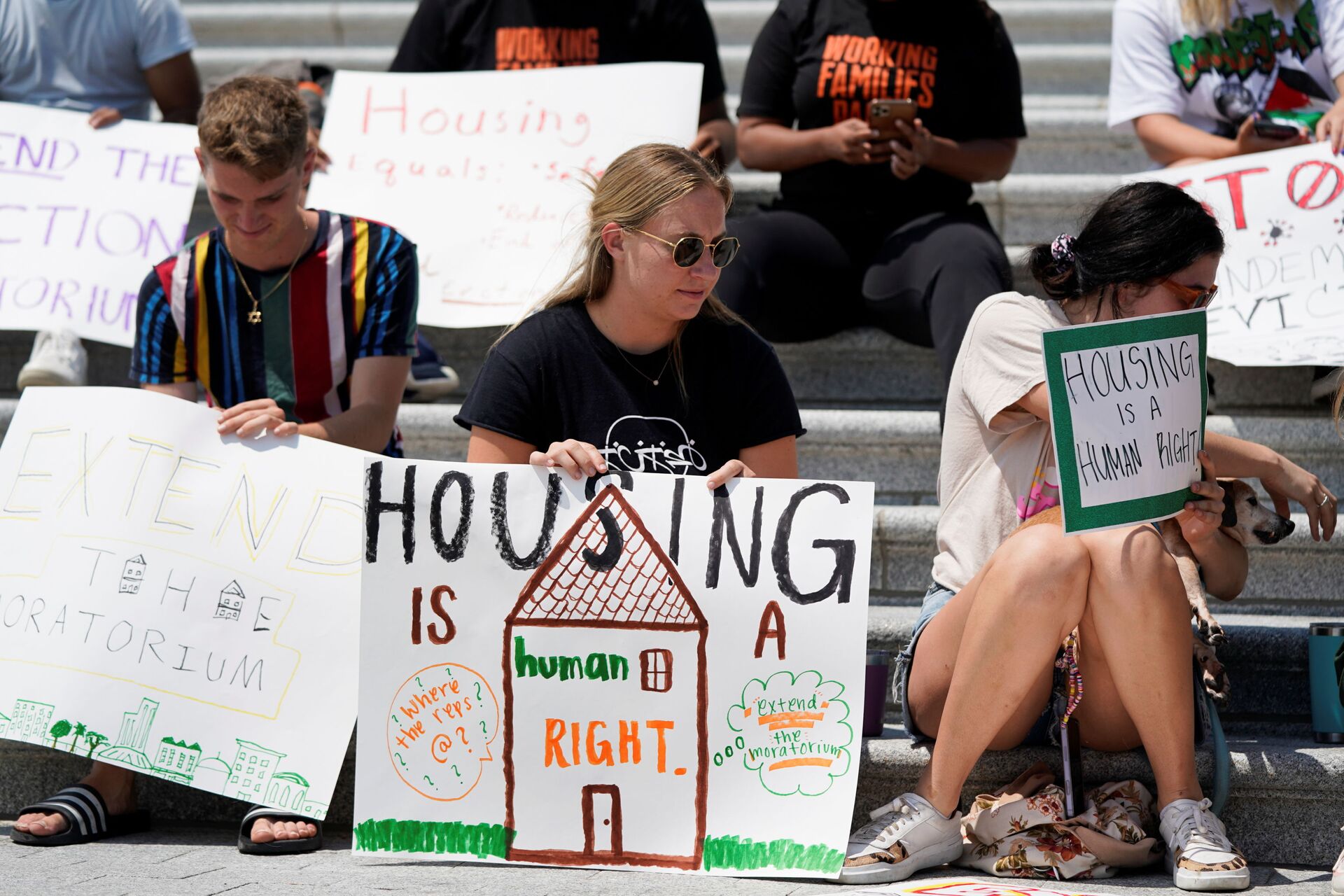DC Federal Judge Unsure She’s ‘Not Tied’ by Ruling to Keep Eviction Ban in Place Amid New Litigation

CC BY 2.0 / Bill Oxford /
Subscribe
Roughly 11 million Americans who fell behind on their rent during the pandemic are at risk of eviction if a federal moratorium is thrown out. Issued after millions of jobs disappeared or were cut due to lockdowns, the Biden administration chose to let it expire amid an economic recovery earlier this year, although millions remain unemployed.
In late June, the US Supreme Court ruled the pandemic-related ban on evictions had to go at the end of July, but gave no official explanation as to why apart from that the US Centers for Disease Control and Prevention had exceeded its statutory authority under the Public Health Service Act. On Monday, Judge Dabney Friedrich of the US District Court for the District of Columbia heard the group of Alabama and Georgia realtors behind the original challenge to the moratorium present their case for striking down the latest one, issued on August 3.
The realtors asked Friedrich, a Trump appointee who was first to strike down the ban in May, to immediately vacate the most recent order.
“Tell me, why am I not tied in light of the DC Circuit's opinion?” she replied, referring to an early June ruling on an appeal of her decision which said that the ban should remain in place during litigation. The plaintiffs argued it was a different situation.
The US Department of Justice also argued that the US was in a different situation in early August than it was in June, when COVID-19 cases bottomed out and the economy seemed to be on a course for returning to some semblance of normality.
“We’re here today because of the Delta variant, because cases have increased seven-fold since the end of June,” Deputy Assistant Attorney General Brian Netter told the judge. “We’re in a new chapter of this pandemic.”
The seven-day average of daily new COVID-19 cases in the US on Sunday was over 97,000, the highest it’s been since February, when the US was exiting its worst phase of the pandemic thus far. According to the CDC, essentially all the new cases are of the Delta variant, an ultra-transmissive variant that originally emerged in India and has proven to have a limited resistance to existing vaccines.
Moreover, the nation’s vaccination campaign has steadily slowed down since its peak in April, when more than 4 million Americans were getting a shot every day. Vaccinations have picked up slightly since the beginning of August, with 714,000 people getting their shot on August 6 and 50.2% of the population vaccinated overall, but in areas of the South and Great Plains, vaccination rates are often half that of states in the northeast and west coast, where in states like Vermont as many as 87% of people have received at least one vaccine dose.

People camp out on the steps of the U.S. Capitol to highlight the upcoming expiration of the pandemic-related federal moratorium on residential evictions, in Washington, U.S., July 31, 2021.
When the CDC first introduced the ban in September 2020, it was to plug a hole created by the expiration of a federal law dating to the spring that had barred landlords and courts from evicting tenants on the grounds that sheltering at home was the best defense American society had against the spread of the virus at that time. When Alabama and Georgia Realtors sued, Friedrich found the CDC had overstepped its authority, and when the Biden administration implemented a new “targeted” moratorium last week, it in turn argued that the order was different enough from the old one to not be subjected to its limitations.
Friedrich said Monday that “it’s really hard … to conclude that there’s not a degree of gamesmanship going on.”
“The court should not tolerate the government getting away with it,” Shumate replied, quoting Biden saying that “the bulk of the constitutional scholars say it’s not likely to pass constitutional muster.” The administration’s aim was thus to buy itself time with litigation in order to distribute more of the $46 billion in emergency rental assistance already set aside for paying off renters’ debts, he argued.
Friedrich wasn’t so sure, and promised to deliver a ruling in the near future.
When the ban was reinstated on August 3, it came after several days of confusion and passing of blame through the federal government: the Biden administration said that, according to an opinion by Associate Supreme Court Justice Brett Kavanaugh that accompanied the June 29 ruling, a renewal of the eviction ban had to come via legislation. However, the House went into summer recess and lawmakers left town on July 29 without having attempted such action, and House Speaker Nancy Pelosi (D-CA) said it was the CDC’s - and thus Biden’s - responsibility.
Meanwhile, Rep. Cori Bush (D-MO) called on concerned citizens on the evening of the 29th to occupy the Capitol steps in protest, demanding the eviction ban be reinstated. After four days of round-the-clock demonstration that attracted hundreds of people and became a national spectacle, Biden relented and issued the new order.
A separate ban forestalling foreclosures of homes behind on mortgage payments during the pandemic also expired on July 31, but aside from a series of mitigating measures implemented by the Consumer Finance Protection Bureau to soften the blow, no effort has been made to reintroduce it.

